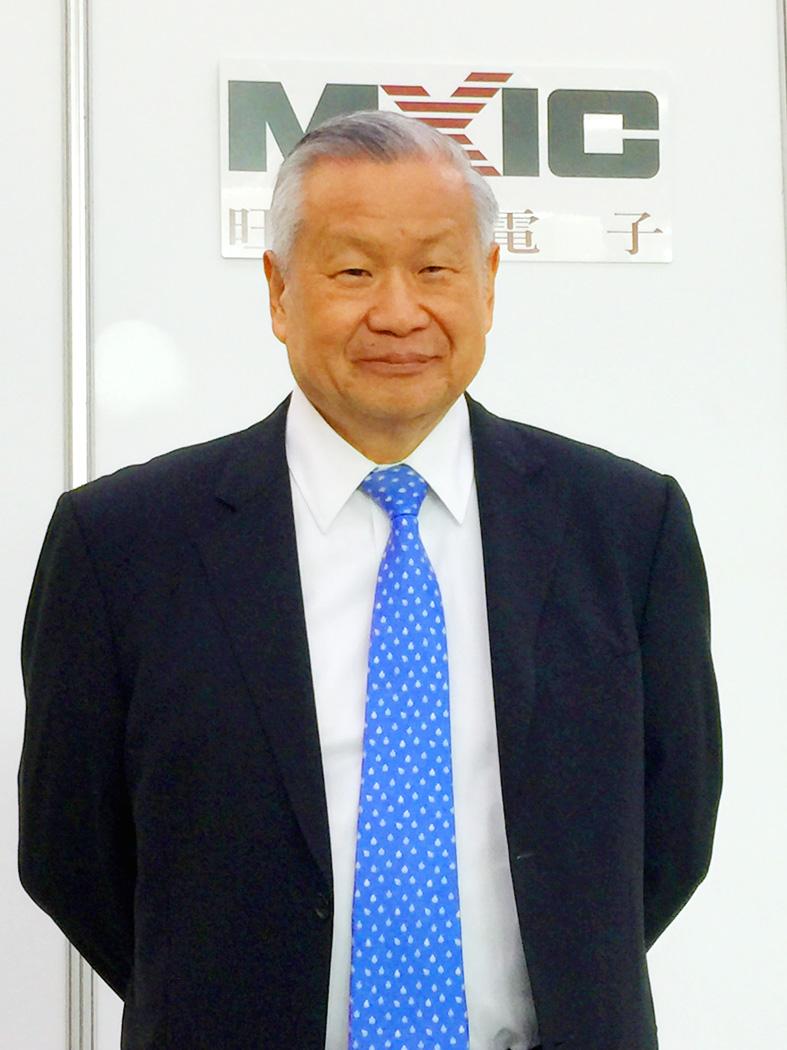Macronix International Co (旺宏), the world’s biggest supplier of NOR flash memory chips, yesterday said that demand is surprisingly strong through next year, with some customers even seeking year-long contracts, as it rejected Morgan Stanley’s bearish view on memory stocks.
The Hsinchu-based company said that the growth momentum is also backed by new orders and new clients amid rising demand for servers, automotive, medical and industrial devices, as well as 5G-related applications, from the US, Europe and Japan.
In addition, Macronix is receiving orders transferred from rivals, whose factories were temporarily shut down due to natural disasters or other factors, it said.

Photo: Grace Hung, Taipei Times
“We are not affected by the uneven supply of components,” Macronix chairman Miin Wu (吳敏求) told investors during an online media briefing. “Our book-to-bill ratio is so high that it surprises us.”
The company’s book-to-bill ratio remained above 1, while revenue has reached new highs over the past 10 months.
Macronix posted record revenue of NT$4.28 billion (US$153.58 million) last month, up 36.4 percent year-on-year.
“Demand for automotive devices has been increasing,” Wu said. “We are seeing some prominent companies, including those from Japan, are turning to Macronix for help, as their suppliers cannot provide any more chips.”
“We are seeing good business through next year,” he said, adding that Macronix has clinched long-term supply agreements at good prices.
Despite the strong revenue growth and rosy prospects, Macronix’s stock has fallen more than 17 percent to NT$37.65 yesterday from NT$45.45 on Aug. 5.
The company blamed the results on Morgan Stanley’s downgrade of its stock to “equal weight” along with other DRAM chipmakers.
In a research note titled “Memory: Winter is coming,” Morgan Stanley analysts cut Macronix’s target price to NT$44 from NT$54.
The researcher warned about a pullback in chip demand, as the industry is entering the late stage of an upcycle.
The price hikes enjoyed by chipmakers are likely to reverse next year, it said.
Macronix said that Morgan Stanley has mistakenly put NOR flash memorychip makers alongside DRAM chipmakers.
DRAM chipmakers might see some weakness due to component supply bottlenecks, but that is not the case for NOR makers, Wu said, adding that the bearish comments were groundless.
The outlook for NOR flash memory chips remains strong in the second half of the year, Wu said.
Automakers are likely to face a new headache with shortages of flash memory chips, he said.
Macronix shareholders yesterday approved a cash dividend distribution of NT$1.2 per common share.
That represents a payout ratio of about 41 percent based on the company’s earnings per share of NT$2.9 last year.

In Italy’s storied gold-making hubs, jewelers are reworking their designs to trim gold content as they race to blunt the effect of record prices and appeal to shoppers watching their budgets. Gold prices hit a record high on Thursday, surging near US$5,600 an ounce, more than double a year ago as geopolitical concerns and jitters over trade pushed investors toward the safe-haven asset. The rally is putting undue pressure on small artisans as they face mounting demands from customers, including international brands, to produce cheaper items, from signature pieces to wedding rings, according to interviews with four independent jewelers in Italy’s main

Japanese Prime Minister Sanae Takaichi has talked up the benefits of a weaker yen in a campaign speech, adopting a tone at odds with her finance ministry, which has refused to rule out any options to counter excessive foreign exchange volatility. Takaichi later softened her stance, saying she did not have a preference for the yen’s direction. “People say the weak yen is bad right now, but for export industries, it’s a major opportunity,” Takaichi said on Saturday at a rally for Liberal Democratic Party candidate Daishiro Yamagiwa in Kanagawa Prefecture ahead of a snap election on Sunday. “Whether it’s selling food or

CONCERNS: Tech companies investing in AI businesses that purchase their products have raised questions among investors that they are artificially propping up demand Nvidia Corp chief executive officer Jensen Huang (黃仁勳) on Saturday said that the company would be participating in OpenAI’s latest funding round, describing it as potentially “the largest investment we’ve ever made.” “We will invest a great deal of money,” Huang told reporters while visiting Taipei. “I believe in OpenAI. The work that they do is incredible. They’re one of the most consequential companies of our time.” Huang did not say exactly how much Nvidia might contribute, but described the investment as “huge.” “Let Sam announce how much he’s going to raise — it’s for him to decide,” Huang said, referring to OpenAI

The global server market is expected to grow 12.8 percent annually this year, with artificial intelligence (AI) servers projected to account for 16.5 percent, driven by continued investment in AI infrastructure by major cloud service providers (CSPs), market researcher TrendForce Corp (集邦科技) said yesterday. Global AI server shipments this year are expected to increase 28 percent year-on-year to more than 2.7 million units, driven by sustained demand from CSPs and government sovereign cloud projects, TrendForce analyst Frank Kung (龔明德) told the Taipei Times. Demand for GPU-based AI servers, including Nvidia Corp’s GB and Vera Rubin rack systems, is expected to remain high,